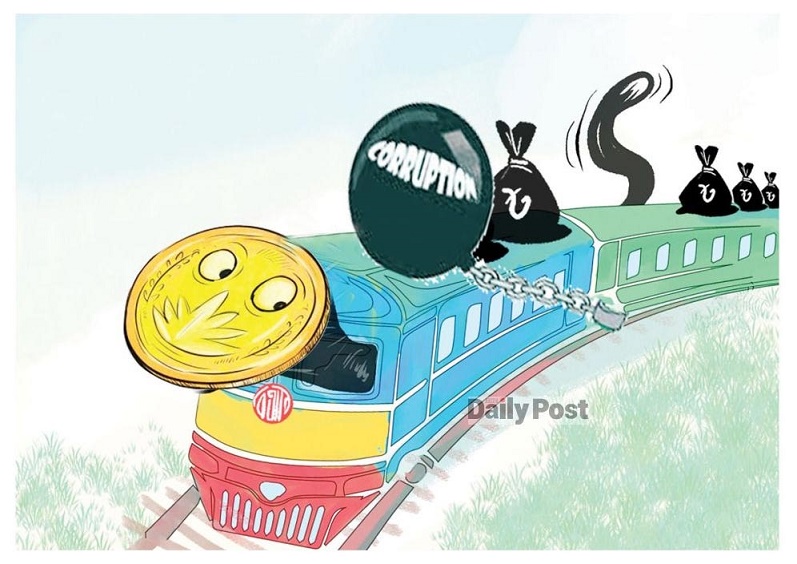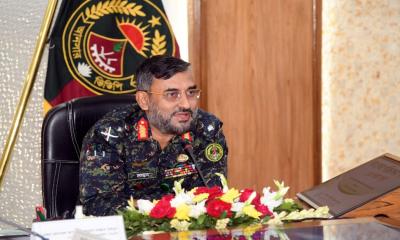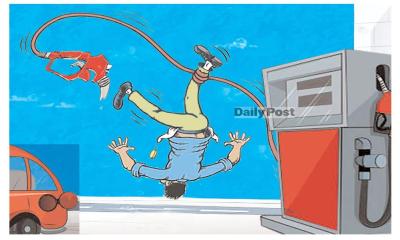Our neighbor country India runs 11000 trains per day with profit, but we are in a loss in railway division since the independence.
Railway sector, once profitable segment, has suffered huge losses in the last decade and a half. In the last 15 years, about Tk 88,000 crore has been invested in the railways and where loss has been counted around Tk 21,000 crore.
That is, the Railway has to count an average loss of Tk 1,500 crore every year. As a result, the expenditure is more than two and a half times more than the income of the railway. This information has been revealed by the Ministry of Railways sources.
According to railway sources, the operating ratio of the railway in Bangladesh has been increasing for the last 24 years, resulting in increasing losses. At present, the authority has to spend Tk 2.58 to earn Tk 1 only.
According to railway data, the best operating ratio of railways in Bangladesh was 95.9 percent in 1998-99 fiscal year. That is, the Railways spent 95.9 paisa for earning Tk 1 in that financial year. Since then, the operating ratio of the railways has only increased.
Meanwhile, a list of railways expenditure of last 15 years has been found. It was known that about Tk 88,000 crore has been invested in the railway infrastructure sector during this period. From June 2009 to June 2024, Tk 21,078 crore was spent on 89 projects. There are 32 ongoing projects worth Tk 1,41,472 crore. These projects have cost Tk 66,853 crore till April this year. In the last 15 years, a total of Tk 87,931 crore has been spent on the development of the railway, including completed and ongoing projects.
According to railway data, the operating ratio of the company was 158.92 percent in the fiscal year 2008-09. That is, in that financial year, the expenditure was Tk 1.59 against the income of Tk 1. The company has released the latest information on the operating ratio for the fiscal year 2020-21. It shows that the operating ratio increased to 258 percent in that financial year. That is, at this time it cost Tk 2.58 to earn Tk 1. At that time, the railways incurred a loss of Tk 1,756 crore. Meanwhile, the transportation of goods by rail has decreased much more than before.
According to the concerned, in the fiscal year 1999-98, 12 percent of the country's total import and export goods were transported by rail, but now the rate is only 3 percent. The amount of income that is earned by transporting goods in one train is not even done by running two passenger trains.
Experts said that if the railways can be made corruption free and unplanned expenditure can be stopped, then the losses will be reduced to a great extent. In addition, ticketless travel will be reduced to zero. Trains should be operated with 100 percent coaches, the number of trains on popular routes should be increased. Besides, we have to pay attention to the transportation of goods. Then it will be possible to make the railway profitable again.
Identifying the unplanned project for this, Railway Ministry Secretary Abdul Baki said, "There was a deficiency in the plan. The projects have been taken without proper feasibility study. Later, the cost of the projects increased several times. There was no assessment at that stage. That's why there have been losses in the past and someone else's pockets have been heavy. In addition, the loss of the railways has increased due to the failure to operate the mentioned number of trains in the project even after the completion of the project, traveling without tickets, running with fewer bogies of most trains and the syndicate inside the railway. Meanwhile, the Anti-Corruption Commission (ACC) is in the field to investigate corruption in the railway and action will be taken if the allegations are proved."
At present, 29 more mega projects are underway at a huge cost, he added. Financial and other aspects are also being examined, including the rationale of these projects.
Secretary General of Bangladesh Passenger Welfare Association Mozammel Haque Chowdhury said that railways are the base of corruption. Those concerned do not pay attention to passenger service and safety. All eyes are on the new project. Most of the officers in charge work as PDs (Project Directors) of various projects. They look for honey in PD. Most of the existing railways are dilapidated. Accidents occur between nineteen and twenty. Ordinary passengers are getting crippled with loss of life.
Bangladesh University of Engineering (BUET) Professor Dr M Shamsul Hoque said that different projects are being taken up and implemented in the railways. The stakeholders cannot overcome the fact that Railways is not a state-owned business. Various countries, including India, have become particularly profitable institutions with the highest level of passenger service in the railway sector. Bringing everyone from officers to employees accountable will increase revenue. It is time to find out why new railways are costing more than any other country in the world. It is important to hold accountable those involved in procurement and management as to why the train is running at the same speed even though a full-engine coach (120-30 km per hour) has been introduced.
ZH






